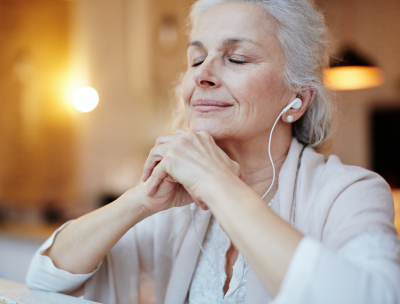
Healthy Minds
Thursday 4th June 2020
The journey from diagnosis to treatment of heart valve disease provides a mental health challenge as much as a physical one. It is, therefore, essential that those affected by heart valve disease focus on the psychological aspects of their journey.
In addition to the challenges of diagnosis and treatment, our stress and anxiety are exacerbated by COVID-19 and a period of self-isolation for those with pre-existing conditions . And though the Government has relaxed some rules, for many with pre-existing conditions, these relaxations haven't meant much change to their daily life. It is now more critical than ever that we do all that we can to support our mental wellbeing and promote a healthy mind.
Friends and Family
Social distancing and self-isolation will be testing for many people. Humans are innately social, and we use our connections with one another to give us strength, comfort, safety, happiness and love. Your friends and family should be a part of your valve disease journey.
We are in a time where stress and anxiety are amplified, and social connections reduced, and we must use all the tools at our disposal to combat this. Our relationships may need to take on a new form, but the strength and comfort they give us need not be diminished at this time.
So, make a connectivity plan with your friends and family, and make each day an opportunity to catch up with someone you love. These connections should be an opportunity to escape, so try and limit the amount you talk about COVID-19. Start a book club, a knitting club, cook together, clean together, talk about sport or just reminisce, and fill this time and space with fun and enjoyment.
Utilise online resources such as Skype, Zoom, Teams or House Party, and connect visually with those who you cannot see. Remind yourself, that this is not a permanent thing and things will return to normal, but be sure to make the most of the digital connectivity resources available .
Community Support
If you are feeling very lonely and need someone to talk to about your feelings then Samaritans, Mind, Shelter and many more national charities have set up helplines and peer support communities to help people through this challenging period.
At a local level, there are charities across the country trying to support isolated people, as well as local community groups which have been created in response to the crisis. Reach out, ask for support, and you could form a connection that lasts long after COVID-19.
Loneliness and social isolation not only affect our mental health but our physical health. Positive social support can improve our capacity to cope with stress as well as strengthening our immune system. If you've just been treated or are awaiting treatment for heart valve disease, you should use these tools to build a new formatted support network that makes you fit and ready for your recovery/surgery.
You can also join us on our Facebook Group, where our community of supporters use the comment section in our posts to talk to each other, or join one of the many heart valve disease facebook groups that are run by those affected by the disease.
Volunteering is a form of community support that has proven to improve the mental wellbeing of those involved. If you would like to volunteer for Heart Valve Voice email admin@heartvalvevoice.com or find one of the 150,000+ charities in the UK looking for support.
Active Body
One of the most reliable ways to keep your mood stable is to get moving. Exercise whenever your healthcare provider says you can, even if you start out just shuffling down the hospital corridor. After the surgery, you don't want to overdo it, but encouraging yourself to keep moving at a slow and steady rate will help you recover the right way.
Many people find that keeping some sort of routine is very helpful for staying positive during recovery, too. Routines can include whatever keeps your spirits up, provided you have your healthcare providers give it the okay!
We've put together a list of ways you can stay active during the outbreak and after. If you've just been treated or are awaiting treatment for heart valve disease, you should use these tools to build a routine that makes you fit and ready for your recovery/surgery.
Click here to see what sports are suitable for after surgery.
In addition to this, join us every 20th on our Mile Walk, where we ask our supporters to post a picture of them walking a mile for heart valve disease. Regular exercise is key to improved physical and mental wellbeing, and also helps those affected by heart valve disease to monitor their symptoms.
Active Mind
Keeping your mind active is a great way to support your mental wellbeing, and the internet is awash with resources to support your mental wellbeing at this time. Be it learning, playing, talking or meditating - activating your mind will improve your mental wellbeing.
Click here to look at ways of activating your mind during the COVID-19 outbreak.
Click here to see what actives you can participate in.
Talking Therapies
Many people find talking therapies such as counselling and psychotherapy really helpful for managing their mental wellbeing. If you are interested in talking to someone, tell your GP, and they can refer you for therapies. During the COVID-19 outbreak Mind and The Samaritans have set up resources to help lonely and isolated people connect with support.
Click here to find out more.
Alternatively, if you would like to talk to someone at Heart Valve Voice about fears and concerns you have regarding your valve disease journey, email info@heartvalvevoice.com and we can have your questions answered by a clinician or a member of our Patient Advocate Group who was previously treated by heart valve disease. However, please note that we will not be able to give any clinical advice regarding your specific case.
Mindfulness
Mindfulness has proven to be very successful in supporting mental wellbeing, and we were delighted to have Katie Sheen, from Soul Nutrition, join us to deliver her "Discovering Mindfulness' webinar. Katie is an experienced Mindfulness teacher and has been curating workshops for students of all abilities for the last few years, you can access her gentle introduction to Mindfulness here, or go to her website to discover more about Mindfulness.
Click here to view our videos on Mindfulness
